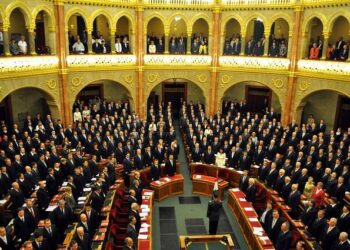Hungary and Slovakia have joined forces to block the European Union’s latest proposed sanctions aimed at Russia, underscoring persistent divisions within the bloc over how to handle the ongoing conflict. The move comes amid efforts by EU leaders to tighten restrictions in response to Russia’s actions in Ukraine, but the reluctance of these two member states highlights the complexities of reaching a unified stance. This development raises questions about the EU’s ability to maintain a cohesive approach toward Moscow as geopolitical tensions continue to escalate.
Hungary and Slovakia Halt EU’s New Russia Sanction Proposals Amid Economic Concerns
In a surprising move within the European Union, Hungary and Slovakia have effectively stalled the latest round of sanctions targeting Russia. Both nations expressed deep economic reservations, citing potential disruptions to their energy supplies and broader economic stability. Their opposition underlines the growing divide within the EU, as countries reliant on Russian energy resources push back against aggressive sanction measures that could exacerbate inflation and supply chain issues.
Key points raised by Hungary and Slovakia include:
- Dependence on Russian gas: Both countries currently import significant shares of their energy needs from Russia, making abrupt changes risky.
- Economic ripple effects: Concerns about industrial output decreases and rising consumer prices impacting vulnerable populations.
- Calls for diplomacy: Advocating for continued dialogue over punitive measures to avoid unintended consequences within the EU.
| Country | Russian Gas Dependency | Sanctions Stance |
|---|---|---|
| Hungary | Over 80% | Blocked sanctions |
| Slovakia | More than 70% | Blocked sanctions |
| Germany | Approx. 40% | Supported sanctions |
Implications of the Blockade for EU Unity and Future Sanction Strategies
The decision by Hungary and Slovakia to impede the EU’s new sanctions against Russia exposes underlying fractures within the Union’s cohesion. These dissenting positions underscore how national interests and economic dependencies can challenge collective policy-making. As energy security and trade pressures mount, the ability of the EU to present a united front on geopolitical issues is increasingly tested. This divergence risks emboldening external actors by revealing cracks in the bloc’s strategic consensus and complicating future diplomatic endeavors.
Moving forward, the EU must rethink how it crafts sanction strategies to ensure broader acceptance and implementation. Emphasizing flexible frameworks that recognize individual member states’ vulnerabilities without compromising the overall objectives will be crucial. Potential areas for adjustment include:
- Tailored economic support packages for affected members
- Incremental sanction phasing to accommodate energy and supply chain concerns
- Enhanced diplomatic engagement to preempt internal vetoes
| Challenge | Potential Solution |
|---|---|
| Energy dependency | Diversify supply sources |
| Economic backlash | Compensation mechanisms |
| Political vetoes | Consensus-building efforts |
Ensuring EU unity in sanction matters not only strengthens its geopolitical stance but also reaffirms the bloc’s foundational commitment to solidarity amid external pressures.
Experts Recommend Enhanced Diplomatic Engagement to Overcome Member State Divisions
In light of the recent stalemate caused by Hungary and Slovakia’s opposition to new sanctions against Russia, diplomatic experts are urging the European Union to intensify its dialogue and mediation efforts. They argue that fostering mutual understanding among member states is crucial to breaking the deadlock and preserving the bloc’s unified stance on foreign policy. Enhanced diplomatic engagement is viewed as a strategic necessity, emphasizing the importance of addressing national interests and concerns while striving for collective action.
Proposed diplomatic measures include:
- High-level bilateral talks aimed at reconciling divergent views on sanctions
- Mediated roundtable discussions with neutral parties to facilitate compromise
- Increased transparency on each country’s geopolitical and economic considerations
| Diplomatic Strategy | Expected Outcome |
|---|---|
| Bilateral Negotiations | Improved trust and concessions |
| Neutral Mediation | Balanced solutions acceptable to all |
| Transparency Initiatives | Enhanced mutual understanding |
In Conclusion
Hungary and Slovakia’s decision to block the EU’s proposed fresh sanctions on Russia underscores the ongoing divisions within the bloc over how to respond to Moscow’s actions. As the European Union seeks a unified approach to uphold its foreign policy objectives, these internal disagreements highlight the challenges of maintaining solidarity among member states with differing economic and political interests. The unfolding debate will be closely watched in the coming weeks, as Brussels attempts to reconcile these differences and determine the future direction of its stance towards Russia.
















